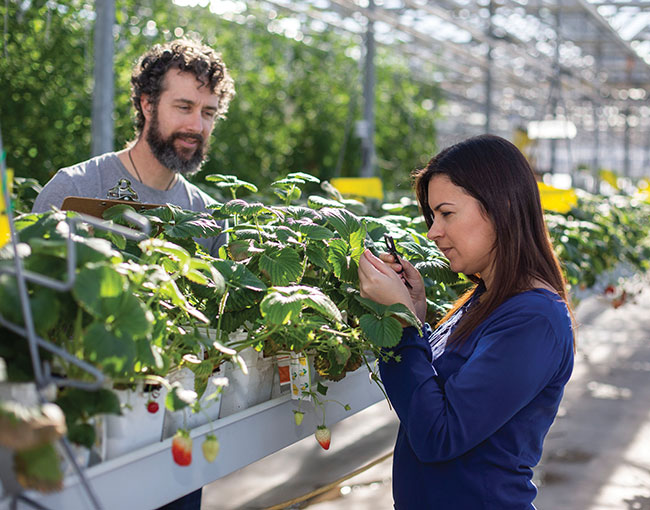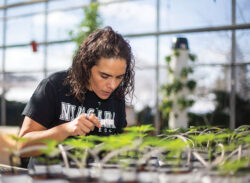
Features
Addressing aphids
Niagara College shares an innovative approach to this challenge in the cannabis industry
September 11, 2023 By Scott Golem
 Two research assistants inspecting crops in the Niagara College Teaching Greenhouse for aphids.
Photo credit: niagara college
Two research assistants inspecting crops in the Niagara College Teaching Greenhouse for aphids.
Photo credit: niagara college Within the rapidly growing cannabis industry, aphids, such as the cannabis aphid (Phorodon cannabis) and the rice root aphid (Rhopalosiphum rufiabdominalis), have emerged as formidable adversaries in commercial cannabis cultivation. These pests contribute to significant yield reductions, quality degradation, and consequential financial losses, leading to severe economic implications.
In response to these challenges, the industry has aimed to employ Integrated Pest Management (IPM) strategies, striking a balance between pest control, environmental preservation, and sustainability. However, the optimal implementation of IPM in cannabis facilities has proven elusive, underscoring the need for further investigation. The Horticultural & Environmental Sciences Innovation Centre (HESIC) at Niagara College (NC) has recently launched collaborative research efforts with leading industry partners, Koppert Canada Limited, and BioWorks Inc., to address these pressing issues.
In the first study, conducted in collaboration with Koppert, HESIC aimed to improve the management of the cannabis aphid, a problematic pest that has resisted control through traditional means. This research explored the combined use of biological control agents Aphidius matricariae and Chrysopa carnea, and environmental control strategies typically implemented in cannabis facilities to manage fungal diseases. Remarkably, it was found that careful cultivar selection and precise manipulation of environmental controls could significantly enhance biological pest control efficacy. This approach led to a two- to three-fold increase in the performance of natural enemies without elevating the risk of fungal diseases. Such findings could notably augment biological control strategies within the cannabis industry, ultimately resulting in improved yields and diminished crop losses.

Research assistant working on project that implements IPM strategies in the NC Teaching Greenhouse
The second study, executed in partnership with BioWorks Inc., targeted the elusive rice root aphid. Since these aphids inhabit the plant’s root system, they remain inaccessible to many conventional control methods. This collaborative research effort was designed to evaluate the effectiveness and potential phytotoxicity of various targeted root/soil treatments to uncover effective control methods. This investigation presented a dual benefit: prospective solutions for controlling rice root aphids, and an invaluable hands-on learning experience for the students engaged in the project.
During this research venture, students from NC’s Commercial Cannabis Production program collaborated with IPM experts. The forthcoming results from this research are poised to influence BioWorks Inc.’s commercialization strategy for their products. The project yielded promising results and offered students unique insights into real-world horticultural challenges.
Both studies, bolstered by the collaborative culture of HESIC and its industry partners, exemplify the Centre’s commitment to combining innovation, education, and industry relevance. They offer concrete evidence of how strategic research can address immediate industry challenges and equip the future workforce with practical problem-solving skills. By investigating and developing novel IPM tools and methodologies, HESIC is making significant contributions towards the evolution of sustainable and efficient practices within the cannabis industry.
The project opportunity brokered by the NC-led Greenhouse Technology Network (GTN), with an investment from the Federal Economic Development Agency for Southern Ontario (FedDev Ontario), was instrumental in facilitating these studies. Such financial support highlights the pivotal role of regional and federal agencies in fostering innovation and progress within Canada’s burgeoning cannabis industry.
As the cannabis industry continues to evolve, the challenges it faces will undeniably shift and multiply. The proactive approach adopted by HESIC not only confronts current industry hurdles, but also invests in the industry’s future by arming the next generation of growers with the necessary skills and knowledge for success. Through its innovative, cutting-edge research, and unwavering commitment to education, NC’s HESIC is playing an indispensable role in shaping a more sustainable, efficient, and productive future for the cannabis industry.
Scott Golem is Research Lead at the Horticultural & Environmental Sciences Innovation Centre, Niagara College Research & Innovation. If you have an innovation challenge, we have the solution. Start the conversation with us today or visit our website at ncinnovation.ca. Together, we will determine how best to meet your needs, whether we perform a quick turnaround service, or a full innovation project. For research and development partnership opportunities, contact David DiPietro, Manager, Business Development, at ddipietro@niagaracollege.ca.
Print this page